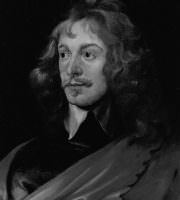About John Suckling
John Suckling, born in Twickenham in 1609 and died in Paris in 1642, was an English poet, playwright and courtier from the time of James I and Charles I of England who is counted among the Cavalier poets. He was a friend of the poets Thomas Carew, Richard Lovelace and William Davenant. He wrote four plays, including the tragedy Aglaura (published 1638), twice performed before Charles II, and his poem Why so pale and wan, fond lover? and the comedy The Goblins (1638), inspired by Shakespeare's The Tempest. But he is best known for his poetry, including A ballad upon a wedding and the satirical A sessions of the poets.Most of his work was published posthumously in 1646 five years after his death in a volume entitled as a Fragmenta aurea, subtitled A collection of all the matchless pieces written by Sir John Suckling, published by a friend (i.e. Humphrey Moseley) to perpetuate his memory. This volume contains his Poems, Letters to various eminent personages on several occasions, three plays, Aglaura, The Goblins and Brennoralt, and the treatise on Socinianism, entitled An Explanation of Religion by Reason.
Among the best known of his minor pieces are the poem Ballade upon a Wedding, for the marriage of Roger Boyle, afterwards Earl of Orrery, and Lady Margaret Howard, I prithee, send me back my heart, Out upon it, I have loved three whole days together, and Why so pale and wan, fond lover? from Aglaura. A collection of Suckling's poems first appeared in 1646 as Fragmenta Aurea. The Selections (1836) published by Alfred Inigo Suckling is in fact a complete edition, of which WC Hazlitt's edition (1874; revised 1892) is little more than a reprint with some additions. The Poems and Songs of Sir John Suckling, edited by John Gray and decorated with woodcut border and initials by Charles Ricketts, was artistically printed at the Ballantyne Press in 1896. In 1910 Suckling's works in prose and verse were edited by A. Hamilton Thompson.
In 1641 he took part in a conspiracy to free the Earl of Strafford from the Tower. When this was discovered, he fled to France, where he probably committed suicide with poison.
Browse all poems and texts published on John Suckling









